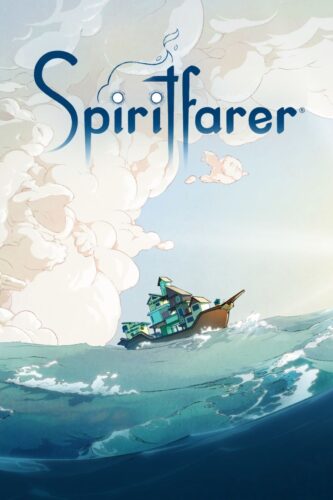 We might have just finished our February contest, but today’s post goes back to October, as the winner of last year’s Celebrating All Things Spooky contest opted for a game review, with Spiritfarer as the chosen game.
We might have just finished our February contest, but today’s post goes back to October, as the winner of last year’s Celebrating All Things Spooky contest opted for a game review, with Spiritfarer as the chosen game.
(While it might seem like I took an exceptionally long time to finish, the winner recomended I wait to start until the final update came out in December.)
Spiritfarer puts you in the shoes of a woman named Stella, who takes over for Charon in his duties of shuttling spirits of the dead to their final rest.
It’s difficult to describe the gameplay genre of this one. At its core, Spiritfarer’s gameplay is sort of a combination of light 2D platforming and a management sim. You have a ship, upon which you can build various houses and facilities, and take care of the spirits who join as your passengers.
You’ll plant seeds and grow crops to cook into meals, fish as you sail around the world, and also use materials you’ve gathered to craft various structures and items to fulfill side quests.
The world is a series of small islands, which you’ll discover as you sail your ship around the world to meet new spirits, take on side quests, and gather resources. It has some light Metroidvania elements, since certain spots and areas can’t be accessed until you have the right abilities, but I’d say that’s a comparatively small part of gameplay.
There are also mini-games that become available on the ship throughout the game to gather special resources.
Exploration and mini-games require a slight bit of platforming know-how, but it’s fairly simple aside from one part that leans a little more into the platforming side of things.
And of course, as you do all of this, it’s to aid the spirits you’ve met and help them move on to their final rest. The tone of Spiritfarer is mixed, since at times (especially when dealing with side quests and characters in the larger world) it can be fairly humorous, while a significant portion of the game deals with death and helping spirits come to terms with their own life, death, and regrets.
However, it never resonated with me quite as much as I expected it to. A couple of characters had stories that hit me hard, but many didn’t strike that emotional chord. That became increasingly common near the end, as I felt I spent less time getting to know the characters and instead simply did a few tasks before they were ready to move on.
(That could partly be a side effect of how by late-game I had so many more resources available to me that I could complete requests faster, though.)
One major thing also disappointed me a bit, although I can see why people would like it.
Overall, I ended my Spiritfarer playthrough with mixed feelings. I expected an emotional experience in which I’d really fall in love with the characters. I ended up with a pleasant game that tugged at my emotions a few times, but didn’t leave a lasting impression. Oddly enough, I found the gameplay more addicting, despite expecting its simple systems to be a backdrop to the characters.
I did enjoy Spiritfarer, in the end, but it was a different experience than I thought it would be.

I was a big fan of Spiritfarer, but I can see why the later game felt like it moved a little more quickly. But I also guess I haven’t played quite as many of the games with the specific theme that you’re mentioning. Still, this was a very moving game for me (and I love the soundtrack!) so I’m glad you got some enjoyment out of it!
Yes, I certainly didn’t dislike it, it just didn’t have quite as much of an impact as I would have liked.